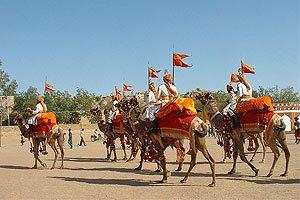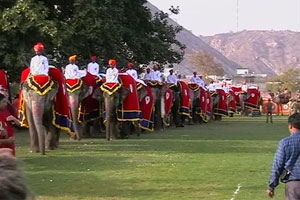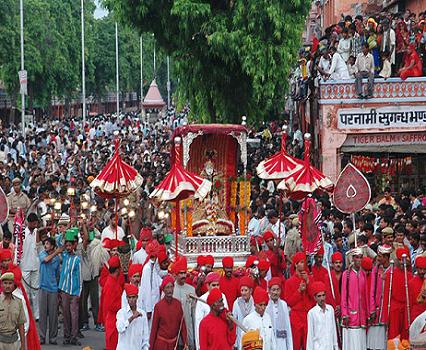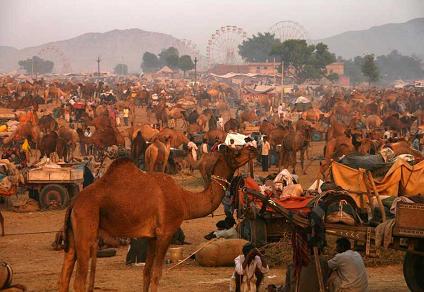|
|
|
Fairs and Festivals of Rajasthan |
|
Fairs and Festivals hold an important place
and reflect the vigour and life style of its people of
Rajasthan. Vibrant colours, music and dance make the golden
sand come alive. In Rajasthan there are fairs for every
religious occasion, for every change of season and for every
harvest. While some of these are traditional festivals, there
are also a large number of festivals that have been recently
introduced by the tourism department to showcase the heritage
of the region. The fair and festivals are celebrated almost
round the year in Rajasthan. These festivals provide an
opportunity to the visitor to gain an insight into the life of
the people of Rajasthan. In some of the fairs and festivals
the elephant race, elephant polo, horse polo, camel races,
dance and music are specially organised for the tourists. Some
of the popular fairs and festivals of Rajasthan are as
follows:
Camel Festival, Bikaner (January)
Camel festival is celebrated in Bikaner, an enchanting desert
city and the only camel breeding farm in the country in the
month of January. It is the most popular festival of
Rajasthan. During this festival there are camel races and
camel dances. Music and dance of Rajasthan also adds charm to
this festival. There are also several unusual folk
performances, and you may also experience the rare fire dance
in the night. |
|
|
|
Desert Festival, Jaisalmer
Desert Festival is one of the most popular and important
festival of Rajasthan. This festival is celebrated on
the Sam Sand Dunes, about 25 km from Jaisalmer, in the
month of January. In this festival, the camels from all
over Rajasthan gather here and present a beautiful show
on the sands of the desert. This festival is celebrated
for three days and during these days, the barren land of
Jaislamer comes |
 |
|
|
to life and
is clustered with the colouful dressed people. The Desert
Festival provides a cultural platform for the rich dance and
music tradition of the state. Some of the major attractions of
this festival are the Gair and fire dances, the turban–tying
competition, camel races, tug-of-war and Mr. Desert contest,
puppet shows, ballads, dances. As darkness falls, the Sam
dunes come alive to the balladeers’ soulful songs of the
soldier-kings and their consorts as the puppeteers dramatise
the epics. In the end, the prize is given to the best dressed
camel.
Nagaur Fair, Nagaur (February)
Nagaur Fair, the cattle fair is held annually in Nagaur in the
month of February. This animal trading fair is the second
largest fair in India and about 70,000 cattle are traded in
this fair. Nagaur becomes a bustling town when the cattle,
horses and camels accompanied by their buyers and owners from
all over the state gather here to buy and sell them. The
Nagauri bulls, the long-lashed camels, cows and the stately
and handsome horses are traded in this fair. The other main
attraction of this fair are the the dusky Rajasthani women,
stunning in their flowing skirts and vibrant beads, and men,
donning colourful turbans and gold earrings and hawking wooden
and leather handicrafts. The hides of the animals, cut into
beautiful patterns, are particularly interesting. The Mirchi
Bazaar, the largest market for red chillies is held during
this fair. The day starts with the buyers and selllers engaged
in earnest bargains and ends with the dances, songs and
merrymaking. The camel races, cock fights and the fascinating
tug-of-war are also held during this fair. It provides an
opportunity to local people as well as the foreign tourists to
know the rural life and participate in various activities and
enjoy the festival.
Baneshwar Fair, Banswara (February)
Baneshwar Fair is held in Baneshwar in Banswara, Rajasthan
during Shivratri in the month of February. This religious
tribal fair is held on the banks of the Mahi and Som rivers in
the forested area aound the border of Rajasthan that it shares
with Madhya Pradesh and Gujarat. In this fair tribal people
from Rajasthan and from the neighboring states of Madhya
Pradesh and Gujarat gather in a large number and offers
prayers to Lord Shiva and set camps in colourful groups.
Chaksu Fair (March)
A large group of rural people gather in Chaksu from all over
Rajasthan during the Chaksu Fair, also known as the Shitla
Mata Fair or Basoda. This fair is considered to be one of the
most colourful event in the Rajasthan fair calendar. This
large fair is held to propitiate the goddess of war whose
wrath can be the terrible scrouge of smallpox unless appeased
by her followers. The food which is eaten on this day consists
of the food which is prepared on the previous day.
Brij Festival (March)
Brij Festival is celebrated a few days before Holi in the
month of March in the Brij area around Bharatpur. This
festival is celebrated on the occassion of the arrival of
spring season with music and dance. |
|
|
|
Elephant Festival, Jaipur (March)
The Elephant festival is celebrated in Jaipur in the
month of March, on the day of Holi. The major
attractions of this festival is the elephant polo,
elephant race, the tug of war between elephants and men
and women and various other cultural programmes. The
most colourful part of this festival is the Holi played
on the back of elephant. In this festival, the
elephants, camels, horses and folk dancers |
 |
|
|
move in
procession and take part in various competitions. In this
festival, the tourists can watch the cultural programmes of
music and dance and also play the festival of colors. The
sight of beautifully dressed elephants moving majestically in
a pageant is certainly a sight to behold. The mahawats or
owners decorate the bodies of the elephants with bright
colours, jhools and heavy jewellery. In the end, the prizes
are given to the most beautifully decorated elephant.
Gangaur Festival, Jaipur (March / April)
The Gangaur festival is a very significant festival of women
in Rajasthan. This festival is mainly celebrated in Jaipur,
Udaipur and Mandawa in March or April. This festival
celebration goes on for almost two weeks after Holi is over.
This festival is devoted to Goddess Parvati, the wife of Lord
Shiva. During this festival the young girls and women wore
their traditional dress of ‘Lehnga’ ‘Choli’ and ‘Odhni’, sing
and dance and pray Issar and Gangaur, manifestations of Shiva
and Parvati, for grooms of their choice while the married
women pray for the well being of their husbands. During this
festival various activities take place in a grand procession
which marks the arrival of Lord Shiva to take his bride home.
Mewar Festival, Udaipur (March / April)
Mewar festival is celebrated in Udaipur during the period of
March or April and coincides with the Gangaur festival. This
festival is celebrated to welcome the spring season. During
this festival, the whole city turns out to mark the end of the
18 day festival and there are devotional music concerts,
performances by the artists in music and dance and fireworks.
The main attraction of this festival is the procession of
colourfully attired women carrying images of the Goddess Gauri
to Lake Pichola and the procession of the floats on the lake.
Ajmer Urs, Ajmer (May)
Ajmer Urs is held in the memory of the Sufi saint Khwaja
Moinuddin Chisti in Ajmer. The date of this Urs is not fixed,
and it is held according to the moon. The Urs commemorates the
symbolic union of the saint with God. During this festival
thousands of pilgrims from all over the world gather at the
shrine and offer their prayers to the holy saint. This
festival is celebrated for almost six days with continuous
music and other programmes and Qawaalis (poems) are sung in
the honour of the saint. On the final day, women wash the tomb
with their hair then squeeze the rose water into bottles as
medicine for the sick. The complete town of Ajmer is decorated
with buntings, and wears the spirit of festivity.
Summer Festival, Mount Abu (June)
Summer Festival is organised in the month of June in Mount
Abu, the only hill station of Rajasthan. This is the only
festival which is celebrated in the summers. Folk dances and
cultural programmes presented by the Bhil tribes of the region
presents a general atmosphere of gaiety in this tiny hill
resort so that the tourists can relax and enjoy themselves. |
|
|
|
Teej Festival, Jaipur (August)
Teej is an important festival of Rajasthan. Teej
festival is celebrated on the onset of the monsoon
season in the month of August. This festival is also
dedicated to the worship of goddess Parvati. The Teej
festival is celebrated all over the state, but, it is
mainly celebrated in Jaipur, where the idol of the
goddess Parvati is taken out in colourful procession
accompanied by song |
 |
|
|
and dance,
for two days. The women and young girls gather in large
groups, dress up in colouful clothes and spend time on swings
decorated with flowers and enjoy the festival by singing and
dancing.
Marwar Festival, Jodhpur (October)
Marwar Festival is dedicated mainly to the music and dance of
the Marwar region. This festival is celebrated in Jodhpur in
the month of October. It attempts to showcase the art and
culture of the Jodhpur region and the Maand festival is the
main part of this huge festival. The Marwar festival allows
the tourists to understand and enjoy the folk music and dance
of not only Jodhpur but also of the whole of Rajasthan. |
|
|
|
Pushkar Fair, Pushkar
Pushkar is famous all over the world due to its Pushkar
Festival which takes place in the month of November.
During this festival the whole of Pushkar is transformed
into a spectacular fair ground where thousands of
pilgrims come to bath in the holy water of Pushkar lake
and pray at the Brahma temple and the actual fair is
held in the vast |
 |
|
|
stretch of
desert. Pushkar fair is also the world's biggest cattle and
camel fair where farmers, breeders and camel traders buy and
sell. It is also a time for friends and families to get
together, camp in the desert, entertain each other with folk
songs and dances, cook meals over camp fires, and shop in the
fair. Special tented camps are set up on this occassion for
the visitors in Pushkar. |
|
|
|
 |
|